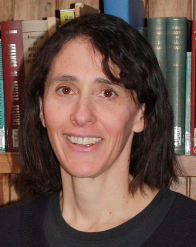梅勒妮·米歇尔 Melanie Mitchell
基本信息
| 类别 | 信息 |
|---|---|
| 姓名: | 梅勒妮·米歇尔 Melanie Mitchell |
| 获奖: | Phi Beta Kappa科学奖(2010),赫伯特·西蒙奖(2020) |
| 国籍: | 美国 |
| 母校: | 布朗大学,密歇根大学 |
| 所属机构: | 密西根大学,圣达菲研究所,洛斯阿拉莫斯国家实验室,OGI科学与工程学院,波特兰州立大学 |
| 主要研究方向: | 复杂系统,遗传算法 |
Melanie Mitchell is a professor of computer science at Portland State University. She has worked at the Santa Fe Institute and Los Alamos National Laboratory. Her major work has been in the areas of analogical reasoning, complex systems, genetic algorithms and cellular automata, and her publications in those fields are frequently cited.[1]
Melanie Mitchell is a professor of computer science at Portland State University. She has worked at the Santa Fe Institute and Los Alamos National Laboratory. Her major work has been in the areas of analogical reasoning, complex systems, genetic algorithms and cellular automata, and her publications in those fields are frequently cited.[2]
梅勒妮·米歇尔 Melanie Mitchell,是波特兰州立大学 Portland State University的计算机科学教授。她曾在圣菲研究所 Santa Fe Institute和洛斯阿拉莫斯国家实验室 Los Alamos National Laboratory工作。她主要的研究领域在类比推理、复杂系统、遗传算法和元胞自动机。在这些领域中,她所出版的书籍、发表的论文经常被引用。[2]
She received her PhD in 1990 from the University of Michigan under Douglas Hofstadter and John Holland, for which she developed the Copycat cognitive architecture. She is the author of "Analogy-Making as Perception", essentially a book about Copycat. She has also critiqued Stephen Wolfram's A New Kind of Science[2] and showed that genetic algorithms could find better solutions to the majority problem for one-dimensional cellular automata. She is the author of An Introduction to Genetic Algorithms, a widely known introductory book published by MIT Press in 1996. She is also author of Complexity: A Guided Tour (Oxford University Press, 2009), which won the 2010 Phi Beta Kappa Science Book Award, and Artificial Intelligence: A Guide for Thinking Humans (Farrar, Straus, and Giroux).
She received her PhD in 1990 from the University of Michigan under Douglas Hofstadter and John Holland, for which she developed the Copycat cognitive architecture. She is the author of "Analogy-Making as Perception", essentially a book about Copycat. She has also critiqued Stephen Wolfram's A New Kind of Science[3] and showed that genetic algorithms could find better solutions to the majority problem for one-dimensional cellular automata. She is the author of An Introduction to Genetic Algorithms, a widely known introductory book published by MIT Press in 1996. She is also author of Complexity: A Guided Tour (Oxford University Press, 2009), which won the 2010 Phi Beta Kappa Science Book Award, and Artificial Intelligence: A Guide for Thinking Humans (Farrar, Straus, and Giroux).
1990年,她在密歇根大学获得了博士学位,在侯世达和约翰·霍兰德 John Holland 的指导下,她开发了模仿的认知结构。也写下了《以类比为知觉》《Analogy-Making as Perception》一书,这本书本质上也是关于模仿。她还批评了斯蒂芬·沃尔夫拉姆 Stephen Wolfram所写的《一种新科学》《A New Kind of Science》 ,并指出遗传算法能够更好的解决一维元胞自动机的大多数问题。她撰写的《遗传算法导论》《 Genetic Algorithms》是一本广为人知的介绍性书籍,由麻省理工学院出版社于1996年出版。她也是《复杂性: 导览》《Complexity: A Guided Tour 》(牛津大学出版社,2009年)一书的作者,该书获得了2010年斐陶斐卡帕科学图书奖。此外,她的新书《人工智能: 人类思考指南》也获得了不错的反响。
观点
While expressing strong support for AI research, Mitchell has expressed concern about AI's vulnerability to hacking as well as its ability to inherit social biases. On artificial general intelligence, Mitchell states that "commonsense knowledge" and "humanlike abilities for abstraction and analogy making" might constitute the final step required to build superintelligent machines, but that current technology is not close to being able to solve this problem.[3] Mitchell believes that humanlike visual intelligence would require "general knowledge, abstraction, and language", and hypothesizes that visual understanding may have to be learned as an embodied agent rather than merely viewing pictures.[4]
While expressing strong support for AI research, Mitchell has expressed concern about AI's vulnerability to hacking as well as its ability to inherit social biases. On artificial general intelligence, Mitchell states that "commonsense knowledge" and "humanlike abilities for abstraction and analogy making" might constitute the final step required to build superintelligent machines, but that current technology is not close to being able to solve this problem.[4] Mitchell believes that humanlike visual intelligence would require "general knowledge, abstraction, and language", and hypothesizes that visual understanding may have to be learned as an embodied agent rather than merely viewing pictures.[5]
虽然梅勒妮·米歇尔强烈支持人工智能的研究,但也表达了对人工智能容易受到黑客攻击且一直受到来自社会的偏见的担忧。关于一般的人工智能,梅勒妮·米歇尔指出,”具备常识性知识”和”能够模仿人抽象和类比的能力”可能是构建超级人工智能所需的最后一步,但目前的技术还不能解决这个问题。[4]梅勒妮·米歇尔认为,像人类一样的视觉智能需要“一般知识、抽象概念和语言”,并假设视觉理解需要作为一种具体化的媒介进行学习,而不仅仅是观看图片。
代表作品
书籍
- Mitchell, Melanie (1993). Analogy-Making as Perception以类比为知觉. ISBN 0-262-13289-3.
- Mitchell, Melanie (1998). An Introduction to Genetic Algorithms遗传算法导论. Cambridge, Massachusetts: MIT Press. ISBN 0-262-63185-7.
- Mitchell, Melanie (2009). Complexity: A Guided Tour复杂性: 导览. Oxford, U.K.: Oxford University Press. ISBN 0-19-512441-3.
- Mitchell, Melanie (October 15, 2019) (in English). Artificial Intelligence: A Guide for Thinking Humans 人工智能: 人类思考指南 (First ed.). Farrar, Straus and Giroux. ISBN 978-0374257835.
文章
- Mitchell, M., Holland, J. H., and Forrest, S. (1994). "When will a genetic algorithm outperform hill climbing?". Advances in Neural Information Processing Systems. 6: 51–58.
{{cite journal}}: CS1 maint: multiple names: authors list (link) - Melanie Mitchell, Peter T. Hraber, and James P. Crutchfield (1993). "Revisiting the edge of chaos: Evolving cellular automata to perform computations" (PDF). Complex Systems. 7: 89–130.
{{cite journal}}: CS1 maint: multiple names: authors list (link) - Cowan, George; David Pines; David Elliott Meltzer (1999). Complexity : metaphors, models, and reality. Cambridge, Massachusetts: Perseus Books. pp. 731. ISBN 978-0738202327. https://archive.org/details/complexity00gcow.
参考文献
- ↑ Google Scholar search for Melanie Mitchell
- ↑ Mitchell, Melanie (October 4, 2002). "IS the Universe a Universal Computer?" (pdf). Science (www.sciencemag.org). pp. 65–68. Retrieved March 23, 2013.
- ↑ "Fears about robot overlords are (perhaps) premature". Christian Science Monitor. 25 October 2019. Retrieved 10 May 2020.
- ↑ "What Is Computer Vision?". PCMAG (in English). 9 February 2020. Retrieved 10 May 2020.
相关链接
- Mitchell's professional homepage
- 梅勒妮·米歇尔 Melanie Mitchell publications indexed by Google Scholar
- CS1 English-language sources (en)
- CS1 maint: multiple names: authors list
- AC with 0 elements
- Pages with red-linked authority control categories
- Cellular automatists
- Complex systems scientists
- Living people
- Portland State University faculty
- University of Michigan alumni
- Santa Fe Institute people
- Brown University alumni
- Los Alamos National Laboratory personnel
- Oregon Health & Science University faculty
- Year of birth missing (living people)
- Researchers of artificial life
